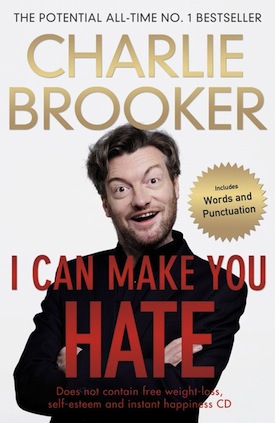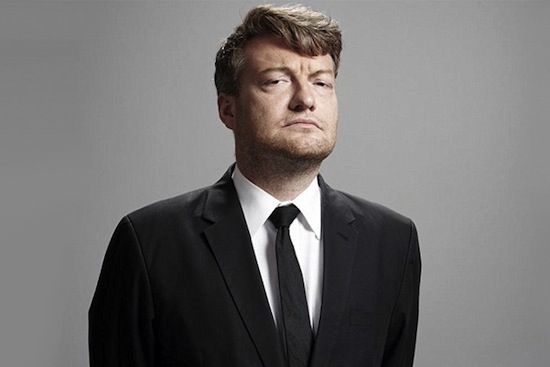"I’m just getting in a car and eating some toast. This is about as multi-tasking as I get." Yet these days, Charlie Brooker juggles the various elements of his career almost constantly – as The Guardian newspaper’s most popular columnist, TV presenter on 10 O’Clock Live and his ScreenWipe and NewsWipe series as well as an increasingly successful TV writer, with recent credits including Channel 4’s dystopian drama Black Mirror and Sky One cop show spoof, A Touch of Cloth. His new collection of newspaper columns and extracts of his TV writing documents a period of transition. It includes the end of his Screen Burn review column in the Guide and the start of his weekly non-television-related columns, his rise as an on-screen presence, and the impact on his life and on all these things of new fatherhood.
"A heck of a lot has happened," he says. "So it acts like a time capsule. It kind of is like a diary, there are things you forget having written – it is scary what percentage of your life you just forget. Whenever I am writing, I always think it is terrible, so it’s interesting to find out when I was right."
As Christmas shoppers will no doubt have spotted, I Can Make You Hate is currently peacocking prominently in most bookshops across the country – its cover alone an incitement to rage, featuring the writer’s rarely seen happy face (albeit a supremely sarcastic version thereof). "I have a strange smile," is his verdict. "Like William H Macy has on his face before he blows his brains out." But what of the contents of the book, which, in its introduction, its writer describes as "unfurling like a long, inky turd"?
In marked contrast with the brash, cartoonish petulance of the book’s jacket – "Only a PRICK wouldn’t buy this book. Don’t be that PRICK" hollers one sticker on the cover, while another confirms that it "Includes: words and punctuation" – his columns on world events (phone hacking, the response to the 2011 massacre in Norway and observations on the NHS) are precise and nuanced, once the bluster is stripped away. But what does he makes of his recent work? And where does Brooker go from here?
Was there a temptation to improve or change things when you went back through your old work?
Charlie Brooker: I’ve made the odd tinker, and I’ve augmented some or added footnotes if I thought I said something massively hypocritical – usually to take myself to task a bit. Even though it only goes back three years, some of it seems like 75 years ago with the rate time is accelerating. I was thinking about Nathan Barley [the series he co-wrote with Chris Morris], and it struck me that at the time we did it, we gave him a video diary and it felt really far-fetched. That was only 2005, it just seems crazy.
Which are the columns that feel fresh in your memory? Your righteous rant about Jan Moir’s column in the wake of Stephen Gately’s death received a lot of attention…
CB: Yes, I remember that one. It seemed to go down all right. I can never predict how they will be received. There are a mix of topics – some weighty, some so feather-light I might as well have not bothered.
In the book you have inserted a footnote, taking yourself to task for diminishing freedom of speech after that particular article…
CB: Only slightly, because I felt that I was effectively arguing that people should shut a columnist down. Which is a little hypocritical. It is one of those things where I tried to be fair. There’s also a Screen Burn in there, the final one, which has been taken as me apologising about being rude about celebrities. Most things I write are tongue in cheek, and that was too – people lose sight of that sometimes. I’m just trying to give an honest, human reaction to things. I thought, working more in TV, I am no longer an outsider, so why pretend that I am, you know?

You can’t do it with the same detached abandon if you’re involved in that world…
CB: It is an inevitable offshoot. I also refer to an instance when I was really rude about someone from a reality show, then they complained. I looked back at what I had written and thought: “What an arsehole I was, they didn’t deserve that!” Some people read that and perceived it as weakness. Having said that, I do write, as I said, with a tongue in cheek – so don’t believe everything I say. So I’m being a liar somewhere. I’m riven with self doubt, no one should bother reading the book, they should ignore every noise I make!
People aren’t going to do that – how have the book signings been?
CB: People always want me to write insults. So I do. Why not? The more insulting you are, the more it delights people. It is like a therapy. I sit there with a pen, a line of people queue up, and I write horrific insults to them all and they go away happy. I don’t know how that has happened. That is what we have to work with, I guess.
Do you feel that pressure to be angry in your writing?
CB: Yes and no. But I am always slightly bemused when people focus on the anger, because it is usually for comic effect. I don’t particularly sit around riven with anger. I guess also it’s a cathartic thing; if you write about it, you’re going to be less furious. You can see the real anger – like in the Jan Moir column – where I get more coldly angry – that is clearly authentic anger. But there’s no point in getting completely furiously angry with Geordie Shore. It becomes funny to me to be that angry over something so pointless. It is different shades of rage, I guess. Oh. Fifty Shades of Rage – that’s what I should have called it. What a bunch of idiots, how did we miss that?
You’re stuck with I Can Make You Hate now – do you think you purge your readers’ anger, so they can say, “yes, I’m furious too” before moving on?
CB: Originally it was going to be called I Can Make You Sad, but I thought that looks strangely melancholic. A bit odd. But I slightly prefer it. I Can Make You Hate is a pisstake of what I feel my persona is; that sort of off-the-shelf, cartoon hate. It’s deliberately tongue in cheek. Some people are thinking it’s a self-help book… like anyone needs help to hate things.
How do you balance writing for and about TV?
CB: The kneejerk comment I get is “if he wasn’t on that show, he’d be slagging it off.” But I wouldn’t be doing it if I felt like that. Because I spent years as a TV critic, I’m attuned to what people might say. It makes it more dismissable. Because writing about television is infinitely easier than writing television, I can say this with some confidence. It is easy to pick the perceived faults. So it doesn’t bother me if someone slags off what I do. I have been lucky with the response. I’ve been treated pretty well by critics. But I’m never going to be the best judge of my work. I’m too close to it, I know the compromises we have made and why – if we didn’t have the budget, maybe it rained that day.
Do you get more pleasure from creating than critiquing it, then?
CB: When I was working as a TV critic, it was never what I wanted to do, I just wanted to write entertaining stuff. That came about because I did this website, ‘TV Go Home’; I was always a reluctant critic, I just wanted to be a writer. It’s a different set of skills, and the satisfaction if you create something that goes down well and that you’re happy with, lasts longer. Although I’m sure everyone working on Prometheus thought it was a major cinematic event that would be talked about for years. Yet we’ve basically all forgotten it ever happened. I don’t know what you’d have to do to leave a legacy in this day and age when everything hangs around digitally forever.

Are you able to watch more for pleasure now?
CB: At the moment, we are preparing for 2012 Wipe, it is like a hybrid of Screen Wipe, News Wipe and Games Wipe and Everything Wipe. Because I had a kid this year, I’m out of the loop with what the hell’s been going on. I’m reliving the year, watching it again with an eye to what is funny. As soon as you have written a series, you watch with a different eye. You’re imagining on some levels how it was made, which can be extremely comical – unless it’s Breaking Bad, which is so good you get totally immersed in it.
Do you ever wish you’d never told anyone about The Wire?
CB: Yes and no. I became a bit of a cheerleader for it, quite late in the day, though, around series three. I’m a bit like that about Breaking Bad now. I’ve moved onto thinking that is the best TV series ever made. So not really, but there was a point where I maybe did. All I’ve really done is say it’s a good programme.
You talk in the book about the Election Debates – comparing it to David Cameron, Nick Clegg and Gordon Brown performing sex acts on a cow. Given that Black Mirror featured the PM getting intimate with a pig, has this been a long-standing obsession?
CB: I had the idea for that yonks ago. In the 90s. But I thought it would be funny if it was a celebrity rather than the PM, so it was knocking about for a while. Dead Set was like that, I had the idea five years before it got made.
Black Mirror is coming back early next year – what can you tell us about it?
CB: That’s where I’m going to now, a meeting about the third episode. In the first series, even though they were similar in tone, they were very different in terms of genre and shooting style. Three different worlds. The first was like a political thriller – it started as a parody of 24, the second was more like an Orwellian Apple Store, and the third was more of a harrowing domestic break up with technological background. The new series is very different again – there are no pigs involved. When you have a baby, you spend a lot of time indoors. So most of the people you are communicating with, you’re doing it by Tweets or emails. And I remember thinking that I am not actually physically speaking with them – what if they have all died and software is emulating their personalities? I would never know. Another episode has a political backdrop, a world in which there is literally a cartoon politician. And the third is close to a zombie-type survival horror, but not zombies. A woman wakes up and 90 per cent of the population are standing around like tourists filming everything on their phones and not intervening, even though appalling things are happening. One is based on an idea Chris Morris and I had when we were doing Nathan Barley.
In the book, you write about fatherhood but also speak as someone who previously got angry about the deification of children…
CB: When it happens to you, you do sort of understand why people have deified their kids. I vowed I wouldn’t be someone who coos over their kiddiwink, but it is hard to avoid. That’s why I took a break from writing, because you realise that most of what they said was probably right, which was really annoying!
You returned to the subject recently and there was an explosion of angry comments. People going “nyer nyer nyer nyer”…
CB: I honestly have no time for all that, I mean, what are you complaining about? You are basically waving a fist at the aging process. Time moving on. I generally just write what I think, and what I think changes over time. It doesn’t bother me, and if anyone wants to get annoyed at that, then they are waving a fist at a balloon. I don’t know what that means, but it’s a nice visual image.
I understand it, I’d have done the same thing, but I think it is a bit childish. Inevitably, as you get older, your life changes, so what you write about changes. If I was to write a review of anything, [being a father] is not going to make any difference – unless it’s a review of a show about babies being thrown headfirst into a Combine Harvester. It might upset me now, whereas before I would just have stood around laughing and laughing.
It seems a hardcore of your audience is very invested in what you write – how do they respond to change like that?
CB: People just don’t like change, they want the same thing. If there is a band you like and they bring out a jazz funk album, you don’t like it. There is a simultaneous thing, you want constant novelty but don’t like change – everyone is like that. But I do think people who comment on newspaper articles seem to take the world about 98 per cent too seriously. I find it a bit weird, calm down! We’re all going to die.
The recurring themes include sleep, the X Factor, aging and lots of David Cameron before the poignant ending, with an article about Geordie Shore…
CB: I’m not very politically savvy. I will be writing about that less in the future. I’m neither clever nor stupid enough to get worked up about it. And yes, I reverted back to reality TV right at the end there, so maybe I’ll go back down that path. I think I will probably go a bit stupid again. I like stupid topics, I might revert to that.

I Can Make You Hate is available now, published by Faber & Faber. Photographs by Chris Floyd
Follow @theQuietusBooks on Twitter for more


